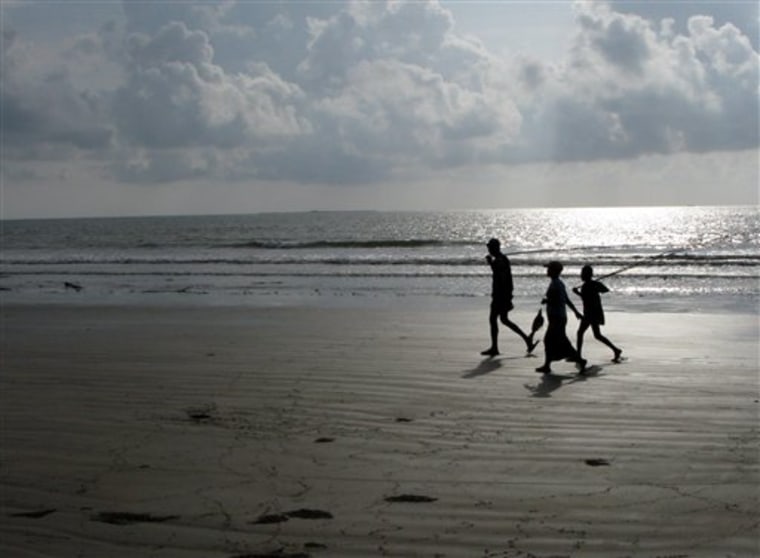When a taxi carrying two Westerners pulled up this past week at the Shwe Sin hotel in Myanmar's cyclone-stricken Irrawaddy delta region, cheers rang out from local residents and workers.
The two were congratulated for being the first foreigners to set foot at the Chaung Tha beach resort since Cyclone Nargis slammed ashore last month, wiping entire villages off the map and killing an estimated 78,000 people.
The disaster, and the military government's "stay-away" attitude toward foreign aid workers and reporters, has scared off tourists, adding to the area's woes.
Residents of Chaung Tha — perched on the western side of the delta, more than 60 miles from the eye of the storm — say no one there was killed or injured and that the hotels were undamaged.
But the fishing village-turned-vacation spot is reeling from the economic fallout of the May 2-3 storm.
"Being in this sector now is like being dead," said Ko Tin Oo, assistant manager of the Shwe Sin hotel. "Now, only the pawn shops are doing good business."
Without a single foreign guest for more than a month, the 37-year-old father of one said he had to pawn some of his wife's jewelry to make ends meet.
He blamed Myanmar's military government as much as the cruel vagaries of nature.
Difficult entry
Seeking to keep prying foreign eyes away from the disaster's aftermath, Myanmar's embassies have been vetting visa applications with a skeptical eye, making it difficult for would-be tourists to gain entry.
Military checkpoints around the main city, Yangon, have kept unauthorized foreigners from entering the delta since the storm.
"How can foreign people come to Myanmar, even if they're brave enough?" asked Ko Tin Oo.
Statistics on international arrivals for May were not yet available, but Oliver Martin of the Pacific Asia Travel Association, PATA, said a "substantial decrease" was expected.
Maarten Groeneveld of the Bangkok, Thailand, branch of Diethelm Travel Asia agency said new reservations for Myanmar have stopped and many existing bookings were canceled.
Any upswing would depend on "how quickly the current relief effort bears fruit and reinstates some sort of confidence internationally," Groeneveld said in an e-mail.
A hard sell
Though the military government has strived in recent years to promote the country as a vacation destination, Myanmar's underdeveloped infrastructure and dismal human rights record have made it a hard sell.
Its tourism sector is minuscule compared to that of neighboring countries. In 2007, Myanmar received 248,000 international travelers compared to nearly 14.5 million in Thailand, according to PATA, which represents some 1,000 travel agents, airlines and other enterprises.
Last year was on track to be a record one for Myanmar tourism until a bloody military crackdown on pro-democracy campaigners in September scared travelers away. The crackdown — in which at least 31 people were killed — also revived calls for a boycott of travel to Myanmar.
Supporters of a boycott contend tourist dollars fatten the generals' coffers. But opponents argue that tourism benefits Myanmar's poor and promotes democratic ideals by exposing citizens of this isolated and tightly controlled country to outside ideas.
"When people hear about Myanmar, it's about political repression and now the cyclone. When you have all this negative press, it doesn't matter how much the government promotes its lovely beaches," PATA's Martin said. "You won't see any bounce back in the short or maybe even in the medium term."
Sitting and waiting
Meanwhile, those who depend on tourist dollars are feeling the pinch.
Yangon's budget hotels catering to backpackers are all but empty. With few takers for their T-shirts emblazoned with images of temples or monks, souvenir vendors at the Bogyoke Aung San market nap in the midday heat.
Tour guides at the city's most famous landmark, the golden-domed Shwedagon Pagoda, sit idly, waiting in vain for potential customers.
Since the storm, 33-year-old guide San San has spent his days chewing betel leaf in the temple's parking lot. He said that May, the start of the monsoon season, is generally a slow month but that he usually averages about three clients a day throughout the off season.
"There's been no one for many days," he said. "All I do is sit and wait."
High-end operators were also affected by the storm.
The luxury cruise ship Road to Mandalay, which normally plies the Irrawaddy River, was badly damaged in the storm, said Pippa Isbell, spokeswoman for the its operator, Orient-Express Hotels, Trains and Cruises. Existing reservations for a "few hundred" would-be passengers have been canceled through September.
"Whatever happens with the ship, we're committed to remaining in Myanmar," Pippa said.
Uncertain future
But the future is less certain for staff at hotels on Chaung Tha beach, an off-the-beaten-path destination whose foreign visitors are mostly budget travelers.
Because it's inside the restricted Irrawaddy delta, special permission is now required to make the five-hour journey over the narrow, pothole-scarred roads. Sometimes the travel permits issued by the Ministry of Tourism are not special enough for the guards at four military checkpoints along the route from Yangon, and travelers are turned back.
With little prospect of filling his 41 empty seaside bungalows, Shwe Sin hotel's assistant manager Ko Tin Oo appealed to his sole foreign guests, an Australian and a French national, to encourage their friends and family to travel to Myanmar.
"Tell everyone you know that Myanmar people need foreign people," he said as he switched on the evening's entertainment, an amateur video of Cyclone Nargis featuring cyclone-toppled trees, crushed houses and bloated bodies floating in flood waters.
